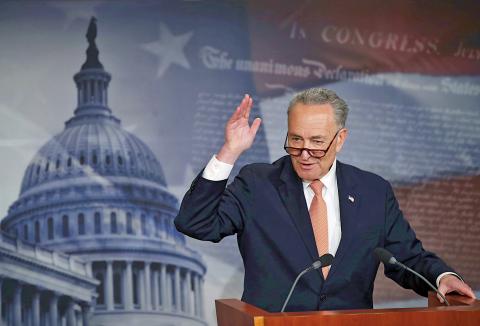US lawmakers yesterday unveiled a huge US$1 trillion-plus spending bill that would fund most government operations through September, but would deny US President Donald Trump money for a border wall and rejects his proposed cuts to popular domestic programs.
The 1,665-page bill agreed to on Sunday is the product of weeks of negotiations. It was made public in the predawn hours yesterday and is tentatively scheduled for a House of Representatives vote tomorrow.
The catchall spending bill would be the first major piece of bipartisan legislation to advance during Trump’s short tenure in the White House. While losing on funding for the wall along the US-Mexico border, Trump won a US$15 billion down payment on his request to strengthen the military, though that too fell short of what he requested.

Photo: AP
The measure funds the remainder of the current fiscal year, through Sept. 30, rejecting cuts to popular domestic programs targeted by Trump, such as medical research and infrastructure grants.
Successful votes later this week would also clear away any remaining threat of a government shutdown — at least until the Oct. 1 start of the 2018 budget year.
Trump has submitted a partial 2018 budget promising a US$54 billion, 10 percent increase for the Pentagon from current levels, financed by cutting to foreign aid and other nondefense programs by an equal amount.
However, negotiators rejected a smaller US$18 billion package of cuts and instead slightly increased funding for domestic programs.
Democrats were quick to praise the deal.
“This agreement is a good agreement for the American people, and takes the threat of a government shutdown off the table,” said Senate Minority Leader Chuck Schumer, a Democrat and a key force in the talks. “The bill ensures taxpayer dollars aren’t used to fund an ineffective border wall, excludes poison pill riders, and increases investments in programs that the middle class relies on, like medical research, education and infrastructure.”
However, some Republican conservatives were wary.
“I think you’re going to see conservatives have some real concerns with this legislation,” US Representative Jim Jordan said on CNN, citing domestic spending obtained by Democrats and other issues. “We told [voters] we were going to do a short-term spending bill that was going to come due at the end of April so that we could fight on these very issues, and now it looks like we’re not going to do that.”
The measure is assured of winning bipartisan support in votes this week; the House and Senate have until midnight on Friday to pass the measure to avert a government shutdown.
Democrats played a strong hand in the talks since their votes are needed to pass the bill, even though Republicans control both the White House and Congress. As a result, the measure does not look much different than the deal that could have been struck on former US president Barack Obama’s watch.

CALL FOR SUPPORT: President William Lai called on lawmakers across party lines to ensure the livelihood of Taiwanese and that national security is protected President William Lai (賴清德) yesterday called for bipartisan support for Taiwan’s investment in self-defense capabilities at the christening and launch of two coast guard vessels at CSBC Corp, Taiwan’s (台灣國際造船) shipyard in Kaohsiung. The Taipei (台北) is the fourth and final ship of the Chiayi-class offshore patrol vessels, and the Siraya (西拉雅) is the Coast Guard Administration’s (CGA) first-ever ocean patrol vessel, the government said. The Taipei is the fourth and final ship of the Chiayi-class offshore patrol vessels with a displacement of about 4,000 tonnes, Lai said. This ship class was ordered as a result of former president Tsai Ing-wen’s (蔡英文) 2018

UKRAINE, NVIDIA: The US leader said the subject of Russia’s war had come up ‘very strongly,’ while Jenson Huang was hoping that the conversation was good Chinese President Xi Jinping (習近平) and US President Donald Trump had differing takes following their meeting in Busan, South Korea, yesterday. Xi said that the two sides should complete follow-up work as soon as possible to deliver tangible results that would provide “peace of mind” to China, the US and the rest of the world, while Trump hailed the “great success” of the talks. The two discussed trade, including a deal to reduce tariffs slapped on China for its role in the fentanyl trade, as well as cooperation in ending the war in Ukraine, among other issues, but they did not mention

Japanese Prime Minister Sanae Takaichi yesterday lavished US President Donald Trump with praise and vows of a “golden age” of ties on his visit to Tokyo, before inking a deal with Washington aimed at securing critical minerals. Takaichi — Japan’s first female prime minister — pulled out all the stops for Trump in her opening test on the international stage and even announced that she would nominate him for a Nobel Peace Prize, the White House said. Trump has become increasingly focused on the Nobel since his return to power in January and claims to have ended several conflicts around the world,

GLOBAL PROJECT: Underseas cables ‘are the nervous system of democratic connectivity,’ which is under stress, Member of the European Parliament Rihards Kols said The government yesterday launched an initiative to promote global cooperation on improved security of undersea cables, following reported disruptions of such cables near Taiwan and around the world. The Management Initiative on International Undersea Cables aims to “bring together stakeholders, align standards, promote best practices and turn shared concerns into beneficial cooperation,” Minister of Foreign Affairs Lin Chia-lung (林佳龍) said at a seminar in Taipei. The project would be known as “RISK,” an acronym for risk mitigation, information sharing, systemic reform and knowledge building, he said at the seminar, titled “Taiwan-Europe Subsea Cable Security Cooperation Forum.” Taiwan sits at a vital junction on